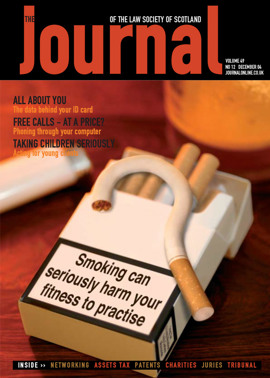Some fine tuning

Guilty plea discounted
More fine-tuning of the Du Plooy principles is to be found in the case of Donald Mackie v PF Linlithgow, unreported at the time of writing but decided on 2 September 2004. By now, though not then, incidentally, the statutory basis for Du Plooy has been modified by section 20 of the Criminal Procedure (Scotland) Act 2004. This substitutes “shall” for “may” in the previously effective section about what the court should take into account in dealing with an early plea, and also provides that the sentencing judge should state what discount he/she has allowed and if there has not been any, why not. I confess to not being absolutely sure about the import of the change from “may” to “shall”, but assuming that there must be something, it may be that whereas previously the sentencer took account of such matters only if they were brought to his/her notice, now he/she is obliged to find out the factual situation as regards the tendering of the plea before proceeding.
Anyway, in Mackie the judge was dealing with a breach of probation, the order being revoked and a four month sentence imposed, no discount allowed. Rather remarkably, it might be thought, appeal was taken on the basis that a discount should have been allowed because the appellant had pleaded guilty before the probation order was made. In dismissing the appeal, while declining to say absolutely that where the court was dealing with a breach of probation the original circumstances might not be considered, in this case the utilitarian aspect of the plea was be said to be negated by the fact that the breach had made necessary an additional diet and also reflected unfavourably on the genuineness of the remorse to be inferred from the guilty plea.
Our next case, Ward v Brown 2000 GWD 31-1228, is not exactly a recent one, but as it is of importance and yet may not have become widely appreciated it is worth a revisit. This was a bill of suspension which the High Court passed, confirming that imprisonment for a breach of a supervised attendance order is a sentence for the purposes of section 204(2) of the Criminal Procedure (Scotland) Act 1995 and accordingly before it is imposed, information must be sought from the local authority if the offender has not been to prison before or is under 21.
Deceased’s statement “decisive”?
Scrutiny of what had been considered settled law in the light of ECHR developments is continued in the case of HMA v Johnston 2004 GWD 30-613, a report of a decision made by Lord Carloway in the course of a murder trial. The subject matter is the admissibility of a statement made by a person since deceased. It was argued for the accused that a statement made by the now deceased boyfriend of the woman allegedly murdered by the accused (which the Crown considered, if true, to be of significance) should be excluded as being in breach of article 6 of the European Convention; that although the court did not have a discretion in terms of section 259 of the 1995 Act to disallow hearsay, the court should do so if a breach of article 6 would inevitably occur; and, finally, that the evidence in question was potentially “decisive” in the sense that that word was used in European jurisprudence, where hearsay could not be used to secure a conviction. The trial judge held that the statement, while perhaps significant, was not in that sense “decisive”. It was also observed that it was doubtful if the admission of the statement of a deceased person could ever fall foul of the terms of article 6(3)(d), which insists that a party should be able to examine witnesses against him.
Crown allowed to speak last
Attention is drawn to issue 34 of Greens Weekly Digest, which contains a number of significant cases. There are two, for example, on points of criminal procedure. Watson v Griffiths (694) is a bill of suspension, which was not passed. The point made on behalf of the appellant was that, by inviting the procurator fiscal to address him again after the defence agent had spoken, the sheriff had breached the terms of section 161 of the 1995 Act, which provides that the accused’s agent is entitled to speak last. It is not clear how the alleged oppression was said to have arisen, since it appears that during the sheriff’s pause for thought before announcing the verdict the appellant’s agent gave no indication of wishing to speak further. In all events the appeal court held that even if there had been a breach of section 161, which was seriously doubted, it would not automatically result in the proceedings becoming null, and in the instant case justice had been done and been seen to be done.
‘No case’ plea wrongly refused
Gonshaw v Barber (695) was an appeal with a bit more to it and indeed was successful. Briefly, this case concerns the question of what happens when a submission of no case to answer is incorrectly refused by the judge of first instance. The charge was an alleged contravention of section 1(5)(a) of the Wildlife and Countryside Act 1981, to the effect that the accused had intentionally disturbed a golden eagle at its nest. After the submission had been rejected, the appellant gave evidence, accepting (with qualifications) that he was the person already identified by a single witness. It was argued that where the evidence led by the prosecution was insufficient to justify a verdict of guilty, an accused was entitled to be acquitted and any subsequent conviction amounted to a miscarriage of justice; and also that an accused should never be prejudiced by a submission of no case to answer being wrongly rejected. The court held, in spite of arguments from the Crown to the contrary, that a miscarriage of justice had occurred and that the effect of the sheriff’s erroneous decision had been to deprive the appellant of the right to be acquitted at the end of the Crown case. Further, it was held that a result of this error was that in order to be able to give evidence in his own defence the accused was put in a position of having to remedy a defect in the Crown case.
Accordingly, it would seem that if a judge is thought to have incorrectly rejected a submission of no case to answer, the accused may be able to give evidence without having to worry about repairing defects in the Crown’s case. However, the point in Gonshaw was that in order to explain what he was doing, the accused had effectively to corroborate the single witness who had put him there at all. Whether the situation would be different if the accused gave other evidence may still be a matter of difficulty, although the tenor of the case is, I think, that if there has been a wrong decision about no case to answer, the accused will be entitled to an acquittal on appeal, because he (or she) has had to consider giving evidence only because the judge of first instance has made a wrong decision. It may well be that if a defence agent is satisfied that a wrong decision of this sort has been taken, he is still best not to call his client, although Gonshaw does seem to permit a defence on the merits being presented without prejudice even though one thinks that one should not have to.
Old friends round again
There are also to be found in this issue of GWD decisions on two of our old friends, Moorov and corroboration. Both should be read because they may have to be cited in any future legal argument on these topics, although I think it is fair to say that both are illustrative of the existing law rather than important because they introduce any important refinements. L v HMA (691) is the Moorov case and inasmuch as the appeal was partially successful, does illustrate circumstances in which the doctrine has incorrectly been allowed to be used by a jury. The appeal also involved a submission that the defence at the original trial had been such as to deny the appellant a fair trial by not pursuing a defence of alibi for part of the period in question, the appellant having been in prison at the time. It was considered that it was a matter for counsel’s judgment whether more harm than good would be done by revealing this.
The corroboration case, Gordon v HMA (692) is about evidence of distress and its corroborative function in rape cases. It confirms that there is ample authority to the effect that where a complainer gives evidence that she has been forcibly raped, that can be corroborated by evidence of distress, for the purpose of proving both that the act was against her wishes and also that the accused had the necessary mens rea for rape.
Surveillance and admissibility
Finally we come to Gilchrist v HMA 2004 GWD 34-689, a drugs case in which a devolution issue had been raised arguing that evidence obtained by directed surveillance was in the circumstances inadmissible as the appellant’s article 8 rights had not been protected. A question arose as to whether or not there had been a valid authorisation, but for our purposes the importance of the appeal lies in two matters which the appeal court made clear. The first was that it cannot be assumed that everything done under an invalid authorisation is, by virtue of that invalidity, an infringement of someone’s article 8 rights: that requires to be considered independently of the validity question. It was also held that there was no infringement of article 8 rights in the sense mentioned in section 1(9) of the Regulation of Investigatory Powers (Scotland) Act 2000, where what had been observed (one man handing over a bag to another in a public place) could have been seen by anyone.
In this issue
- Dear Father Christmas
- The stupidest in the world?
- No butts, no doubts, no regrets
- Bigger Brother
- Born to instruct
- Caught in the net
- A defining era
- 12 tips for Christmas networking
- Phoning for nothing and your clicks for free
- Be prepared
- Some fine tuning
- Brave new world
- Are all bets off for BHB?
- Clash of the Conventions
- Scottish Solicitors' Discipline Tribunal
- Website reviews
- Book reviews
- Farming right to buy






